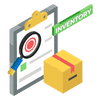How to use retail supplier management systems to enhance risk management
Delve into the role played by supplier management systems to mitigate risks in supply chain operations. We will look at how these systems help organisations to build resilience, ensure continuity, and meet the highest quality and compliance standards.
Powerful business solutions through innovation
User-friendly, easy-to-use interfaces
Focused, industry-specific tech solutions
What is the role and purpose of supplier management systems?
Supplier management systems, also known as supplier relationship management (SRM) systems, are comprehensive software solutions designed to streamline and optimise the processes involved in managing supplier relationships and interactions throughout the supply chain. These systems provide a centralised platform for businesses to effectively oversee their supplier base, from onboarding and performance evaluation to risk assessment and collaboration.
The primary purpose of supplier relationship management systems is to enhance transparency, efficiency, and collaboration within the supply chain ecosystem while mitigating risks and ensuring compliance with quality standards and agreements.
By leveraging technology and data-driven insights, these systems empower organisations to make informed decisions, optimise supplier performance, and cultivate strategic partnerships that drive long-term value.
What role does risk management play in the retail supply chain?
Supplier relationship management systems serve as strategic enablers for organisations seeking to optimise supplier relationships, mitigate risks, and drive operational excellence within the supply chain. Risk management plays a pivotal role in ensuring smooth and efficient business operations.

1. Maintaining continuity
Supply chain disruptions, whether due to natural disasters, geopolitical events, or unforeseen circumstances, can halt production, delay deliveries, and impact customer satisfaction. Effective risk management strategies help identify disruptions, implement measures to mitigate them, and ensure operations continue.

2. Protecting reputation
Trust builds reputation. Supply chain failures can tarnish a retail company’s reputation and erode customer trust. By proactively managing risks, retail organisations can uphold their reputation by demonstrating resilience in the face of challenges, maintaining consistent quality, and meeting delivery standards.

3. Controlling costs
Supply chain disruptions often come with significant financial costs, including lost revenue, increased expenses, and penalties for missed delays. Risk management practices, however, help minimise financial losses by identifying risks early, implementing preventive measures, and having contingency plans put in place.

4. Displaying supply chain resilience
Supply chains of contemporary organisations are vulnerable to a range of risks, from cyberattacks to trade disputes. Building resilience through risk management enables firms to adapt to changing market conditions, geopolitical dynamics, and technological advancements, ensuring long-term
sustainability.
Risk management in supply chain operations is essential for safeguarding business continuity, protecting reputation, controlling costs, ensuring compliance, optimising efficiency, and building resilience in an increasingly complex and uncertain business environment.
What are the functionalities of supplier relationship management systems?

1. Supplier onboarding and qualification
These systems facilitate the seamless onboarding of new suppliers by streamlining the qualification process, verifying credentials, and assessing capabilities to ensure alignment with organisational requirements and objectives.

2. Performance monitoring and evaluation
Enables real-time monitoring and evaluation of performance against metrics and key performance indicators (KPIs), tracking factors like timeliness, consistency, and cost-effectiveness where firms can identify areas for improvement.

3. Risk assessment and mitigation
Supplier management systems help organisations proactively identify and mitigate various risks associated with supplier relationships, including financial instability, geopolitical factors, compliance issues, and supply chain disruptions.

4. Collaboration and communication
Supplier systems facilitate seamless communication and collaboration between firms and their suppliers through integrated communication channels. These systems strengthen relationships and enhance collaboration across the supply chain.
By leveraging technology-driven solutions to streamline processes, enhance visibility, and foster collaboration, these systems empower firms to proactively manage supplier relationships and achieve sustainable competitive advantage in today’s dynamic business environment.
What are the tips for selecting the right supplier management system for your organisation?
Selecting the right supplier management system is a critical decision that can significantly impact your organisation’s supply chain efficiency, risk management capabilities, and overall competitiveness.

1. Assess scalability and flexibility
Choose a supplier management system that can scale alongside your business growth and adapt to evolving requirements. Look for flexible solutions that offer customisable features, integration capabilities with existing retail supply systems, and support for multi-site or multi-lingual operations.

2. Consider user-friendliness
Ease of use is crucial for the successful adoption and utilisation of the supplier management system across your organisation. Prioritise systems with intuitive interfaces, user-friendly navigation, and comprehensive training and support resources to facilitate smooth implementation and user acceptance.

3. Evaluate integration capabilities
Ensure that the supplier system seamlessly integrates with other business systems, such as enterprise resource planning (ERP), procurement, and supply chain software. Integrated systems enable data sharing, process automation, and real-time visibility, enhancing operational efficiency and decision-making.

4. Assess data security and compliance
Choose a supplier management system that prioritises data security and compliance with industry regulations and standards. Look for systems with robust security features, data encryption, access controls, and audit trails to protect sensitive information and ensure regulatory compliance in retail.

5. Review vendor reputation and support
Research the reputation and track record of potential software vendors, including their experience, customer base, and recognition. Evaluate vendor services, including technical assistance, software updates, and ongoing maintenance, to ensure reliable, responsive support throughout a software lifecycle.

6. Request demonstrations and references
Schedule demonstrations or trial periods with shortlisted supplier systems to evaluate functionality, usability, and fit for your firm’s requirements. Request references from existing customers to gain insights into their experiences with the software, implementation process, and overall satisfaction.

7. Consider the total cost of ownership (TCO)
Assess the total cost of ownership of the supplier management system, including fees, implementation costs, ongoing maintenance, and integration expenses. Compare pricing models, subscription plans, and ROI potential to determine the most cost-effective solution for your specific organisation.

8. Plan for future requirements
Anticipate future business needs, industry trends, and technological advancements when selecting a retail supplier management system. Choose a scalable solution that can accommodate future enhancements, updates, and expansions to support your retail organisation’s long-term growth and competitiveness.
Following these tips and conducting thorough research will allow you to select the right supplier management system that aligns with your organisation’s goals, enhances supply chain efficiency, and mitigates risks effectively.
Key Features of WITMEG to add value to businesses
Are you ready to give the biggest boost possible for your business?
Technical Support
24/7 technical support dedicated to an exceptional customer service
Cloud Sync
Real-time data syncing to the Cloud when connected to an active internet connection
Offline Access
Fully functional system even when there is no internet connection available
FAQs
Yes, some supplier management systems offer features specifically designed to monitor and track sustainability metrics, CSR initiatives, and compliance with ethical standards throughout the supply chain. These features enable retail firms to promote transparency, accountability, and sustainability within their supplier network.
Yes, some advanced supplier management systems leverage predictive analytics and machine learning algorithms to analyse historical data, identify patterns, and forecast supplier performance metrics, such as delivery reliability, quality consistency, and financial stability. These predictive insights enable organisations to proactively address potential risks and optimise supplier relationships.
A supplier management system is a comprehensive solution designed to streamline and optimise supplier management processes, enabling organisations to build stronger supplier relationships, mitigate risks, and drive operational efficiency throughout the supply chain.
Choosing an EPOS system to cater to restaurant operation management
Looking for reliable EPOS solutions for retail to enhance your supply chain operations? Look no further than WITMEG! Our comprehensive supplier system is designed to streamline your procurement processes, optimise supplier relationships, and mitigate risks throughout the supply chain.
Don’t let supply chain challenges hold you back. Get in touch with WITMEG today to unlock the full potential of your supplier relationships and drive sustainable success.
